Blue economy and marine spatial planning
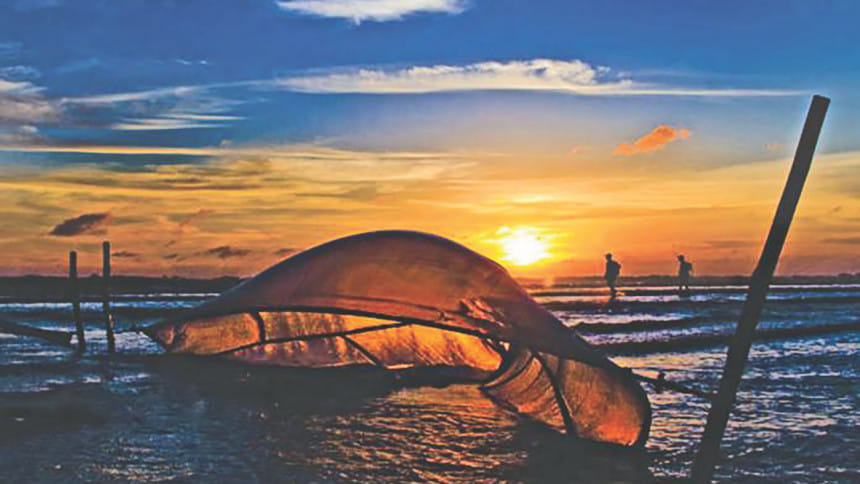
The ocean has been a source of wealth for millennia, linking economies around the world. Many large cities and centres of commerce have been developed based on access to the sea. Oceans and seas contribute to poverty eradication by creating sustainable livelihoods, provide food and minerals and regulate global climate and weather patterns. International shipping and ports provide crucial linkages in global supply chains and are essential to gain access to global markets serving as highways for seaborne international trade. The oceans are in fact both an engine for global economic growth and a key source of food security.
Born in riverine Bangladesh, the Father of the Nation Bangabandhu Sheikh Mujibur Rahman had an unfathomable interest for the betterment of the lives of the riverine and coastal population. Bangabandhu was aware of the history and maritime heritage of Bangladesh, especially the shipbuilding traditions and reputation of the master shipbuilders of Bengal that had flourished worldwide.
He felt that with Bangladesh being a maritime nation, our maritime capabilities need to be developed. Foreseeing the huge importance of the Bay of Bengal for the trade and economic development of Bangladesh, immediately after our independence, he developed the maritime sector, upgraded the seaborne transportation with the outside world, reconstructed the seaports of our war-torn country and cleared the mines of Chittagong Port with the help of the Mine Clearance Force from Russia. He understood the need for maritime security for protecting our maritime interests and hence said, "for geo-political needs we should have a strong Navy". It is amazing to see that as a part of the country's reconstruction process, he developed Bangladesh Inland Water Transport Authority (BIWTA) with new dredgers, Bangladesh Inland Water Transport Corporation (BIWTC) with Passenger Ships, Bangladesh Shipping Corporation with a number of seagoing vessels and Bangladesh Navy with a number of warships and Naval Bases.
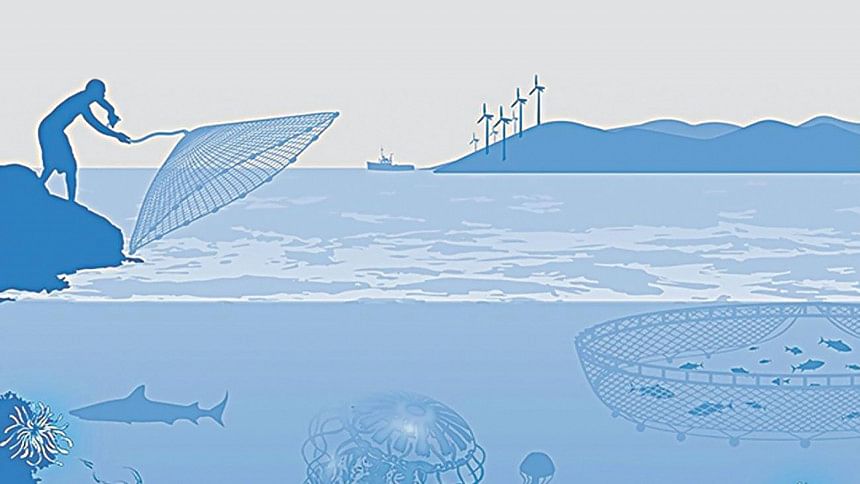
As a great visionary leader, he also envisioned a future Maritime Bangladesh by promulgating "Territorial Waters and Maritime Zones Act 1974", which was a milestone in the maritime history of Bangladesh. The law was framed at a time when the universally accepted international maritime law was yet to get its final shape. Nearly eight years after the enactment of the Law by Bangabandhu, the United Nations (UN) framed "the UN Convention on Law of the Sea" (UNCLOS-III) in 1982.
In fact, the Territorial Waters and Maritime Zones Act 1974 laid the foundation for the excellent blue economy initiatives by the government of Prime Minister Sheikh Hasina, whose leadership and wisdom have earned us a huge maritime area of 1,18,813 square km, after successful maritime boundary delimitation with our neighbouring countries.
The provisions of the 1974 Act actually paved the way for the proper management and protection of coastal marine resources, preservation of bio-diversity, pollution control, coastal zone management, marine protected areas, shipping, fisheries and every aspect of maritime governance one could imagine at that time. The Act provided an excellent roadmap for the delimitation of our various maritime zones and a clear indication of our rights and responsibilities at sea including regulations for ensuring maritime safety and security. Today, on the eve of the "Mujib Borsho", we express our profound gratitude to Bangabandhu, the Architect of Maritime Vision of Bangladesh for providing us with the roadmap towards a Maritime Bangladesh.
CHALLENGES OF BLUE ECONOMY
There has been a growing realisation that the world's oceans require more caring attention and coordinated action. The progressive degradation of ocean health is caused by several human drivers of change like illegal, unregistered and unregulated fishing or in short, IUU fishing, land based and ship-borne marine pollution and unplanned coastal development. The over exploitation of ocean resources is leading to degradation of marine biodiversity and ecological integrity. However, in recent years, the countries around the world have started prioritising on the ocean related issues formulating economic growth policies based on the concept of the blue economy.
The oceans, with a current estimated asset value of USD 24 trillion and an annual value addition of USD 2.5 trillion, would continue to offer significant economic benefits for the coastal states.
But the developing countries have to overcome challenges like unsustainable extraction, destruction of marine and coastal habitats, climate change, sea level rise and marine pollution. A newly emerging issue like ocean acidification resulted in a 26 percent increase in the acidity of the ocean affecting carbon accretion in coral reef causing net decreases in global coral reef coverage. Several key coastal habitats such as mangroves and sea grass meadows have been reduced to 30-50 percent of their historical cover in the last 150 years.
EVOLVING CONCEPT OF BLUE ECONOMY
The blue economy is a developing world initiative, relevant to all coastal states and countries with an interest in sustainable maritime development. It was first prominently addressed during the Rio+20 UN Sustainable Development Conference in 2012. In layman's term, it comprises all the activities of economy which takes place directly or indirectly at seas and the oceans, as well as the coastal waters. It is aimed to enhance livelihoods for the poor, create employment opportunities and reduce poverty.
The National Maritime Foundation, an active Indian think tank, has adopted the following definition of blue economy: "Marine-based economic development that leads to improved human wellbeing and social equity, while significantly reducing environmental risks and ecological scarcities". However, a global definition devised by the Economist Intelligence Unit is: "A sustainable ocean economy emerges when economic activity is in balance with the long-term capacity of ocean ecosystems and remain resilient and healthy". China's idea of a blue economy focuses on "sustainable development and conservation", bringing coastal and ocean resources into a broader integrated plan for national economic development and encouraging the marine industry to play a greater role in the economy." However, the difference between "ocean economy" and "blue economy" is that the former provides no measure or indication of sustainability. But the blue economy concept promotes sustainable development of the ocean economy. It is a pathway over time, where ocean economy transforms via policy reforms towards a blue economy.
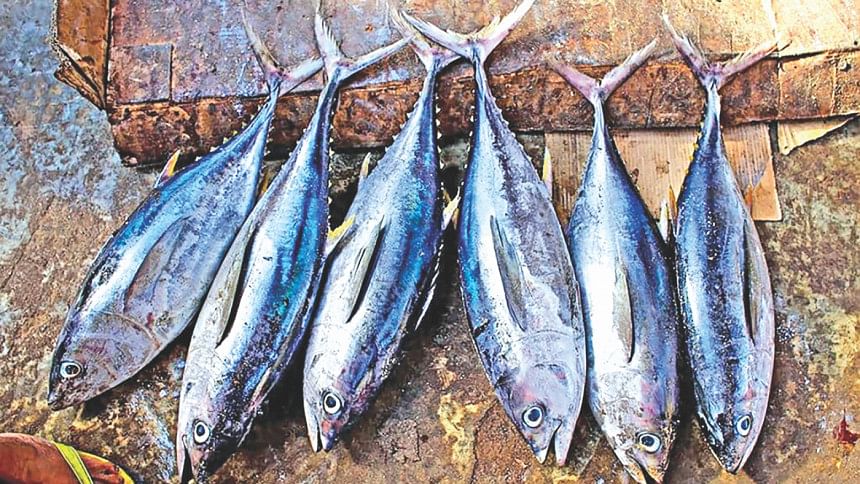
PROSPECTS AND POTENTIALS OF BLUE ECONOMY
A brief overview of the potentials of the blue economy are as follows:
Marine fisheries: Fish is the largest trading item of developing countries, where one billion people depend on seafood for their primary source of protein. About 475 species of fish are found in the Exclusive Economic Zone (EEZ) of Bangladesh compared to 250 sweet water species on land.
Aquaculture: Integrated multi-tropic offshore aquaculture is the fastest growing global food sector, now providing 47 percent of the fish for human consumption.
Marine biotechnology: One of the fastest emerging high-technology sectors in the blue economy is marine biotechnology with a market of about USD 4.6 billion in 2017. It has wide-ranging applications in industrial sectors including pharmaceuticals, cosmetics, nutritional supplements, molecular probes, enzymes and agrochemicals.
Offshore energy and deep-sea mining: The largest chunk of developing countries' ocean economy can be sourced from offshore energy exploration and mining. The seabed currently provides 32 percent of the global supply of hydrocarbons, up from 20 percent in 1980.
Marine tourism and leisure: Globally, coastal and marine tourism represents 5 percent of world GDP. Tourism is human-resource intensive. Increasing involvement of local communities in the value chain can contribute to the development of local economies and poverty reduction.
Shipping, port and maritime logistics: About 80 percent of global trade by volume and over 70 percent by value is seaborne. Smart and deep-water ports, efficient shipping and logistics industries will be instrumental for the development of blue economy.
Shipbuilding, marine manufacturing and ship recycling: Marine manufacturing consists of construction, repair and maintenance of boats, ships, fishing vessels, yachts, floating structures and other marine technology which is an important sector of blue economy. The ship breaking or ship recycling is also another growing industry in the developing countries.
Marine renewable energy: Renewable energy enjoys almost 22 percent share of the global energy mix. There are various forms of marine renewable energy like offshore solar energy, offshore wind energy, wave energy, tidal energy, ocean thermal energy, salinity gradient, ocean current energy and energy from marine biomass.
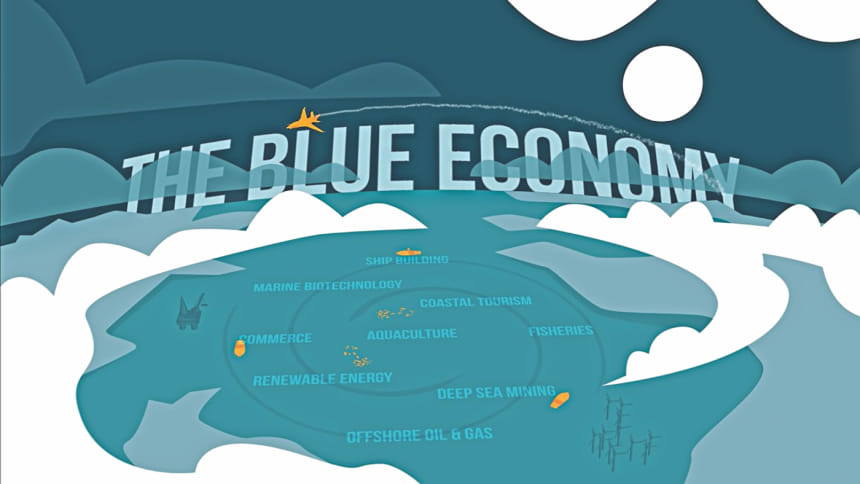
BLUE ECONOMY AND SDG
Blue economy is to be consistent with the three-dimensional sustainable development paradigm involving social, environmental and economic dimensions underpinning the Sustainable Development Goals (SDG). The notion of Blue Economy and the SDG are aligned and mutually reinforcing. There is wide acceptance that in order to implement the blue economy effectively, the SDGs will have to become its foundation and can serve as a guiding methodology for governments to implement, calibrate and prioritise national programmes on blue economy.
MARINE SPATIAL PLANNING (MSP) AND OCEAN GOVERNANCE
The cumulative effect of the increased human activity in the marine environment leads to competition for overlapping and collocated marine space, increased stress on marine ecosystems and conflicting ocean use.
One of the key tools for guiding the design of ocean governance policies is the MSP process. MSP can be defined broadly as a public process of analysing and allocating ocean uses over space and time to achieve economic, ecological and social objectives. While, MSP is a holistic approach of planning that develops a common vision towards effective utilisation of maritime realm, "ocean governance" is the integrated conduct of the policy, actions and affairs regarding the world's oceans for sustainable use of coastal and marine resources reducing the risk of irreversible damage to our marine eco-systems.
The MSP process collects and translates information on the ocean ecosystems and economy spatially, providing a more integrated basis for management decision-making. The process of ocean governance should be integrated horizontally because it requires the participation of governmental institutions, private sectors, NGOs, academicians, scientists, etc., as well as vertically across all the levels of governance within an integrated system with reciprocal coordination. In Bangladesh itself, around 18.2 percent of the population is dependent on the country's ocean economy (World Bank Group, 2018). If developments and investments to boost this economy occur without set standards and policies, they may lead to short-term gains at the cost of long-term sustainability. As such, it is the need of the hour to implement MSP for sustainable ocean governance.
OCEAN POLICY FOR SUSTAINABLE MARITIME DEVELOPMENT
The approach for an ocean policy has to be inter-disciplinary with historians, lawyers, economists and political scientists working with engineers, biologists, chemists and physicists on common ocean interests. In the case of Bangladesh, the overall vision of the ocean policy should be to ensure a healthy sustainable ocean; nurtured, understood and harnessed wisely for the benefit of all in future.
The main elements of ocean policy may be as follows:
i) Conservation of marine biological diversity.
ii) Regional marine planning.
iii) Maintenance of ecosystem integrity.
iv) Multiple ocean use and marine spatial planning.
v) Marine tourism, archaeology and marine protected areas.
vi) Exploration and exploitation of living and non-living marine resources.
vii) Offshore engineering and renewable energy.
viii) Maritime safety and security.
REGIONAL BLUE ECONOMY INITIATIVES IN THE BAY OF BENGAL
The vast maritime-littoral space of the Indian Ocean is of immense geo-political, geo-economic and geo-strategic significance that has always influenced the global economic and security scenario. Historically, the Bay of Bengal region has played a pivotal role as a maritime highway to the greater Indian Ocean—where trade, commerce and cultures were intertwined for centuries.
Today, due to geo-strategic and geo-economic factors, the Bay emerges as one of the most significant regions in the Indo-Pacific. Its close access to the important chokepoints like the Malacca Strait leading into the South China Sea and the proximity to the main axis of the East-West sea route across the Indian Ocean makes the Bay of Bengal the umbilical cord of the economy of the BIMSTEC region.
With huge amounts of unexplored and untapped marine resources lying beneath the ocean, the littorals of the Bay of Bengal should now unite hands for strong partnership and cooperation in the maritime sector in order to reap the benefits of the blue economy. Bangladesh being strategically located at the apex of the Bay of Bengal—having the BIMSTEC Headquarters at Dhaka—is ideally placed to take the lead for various maritime initiatives.
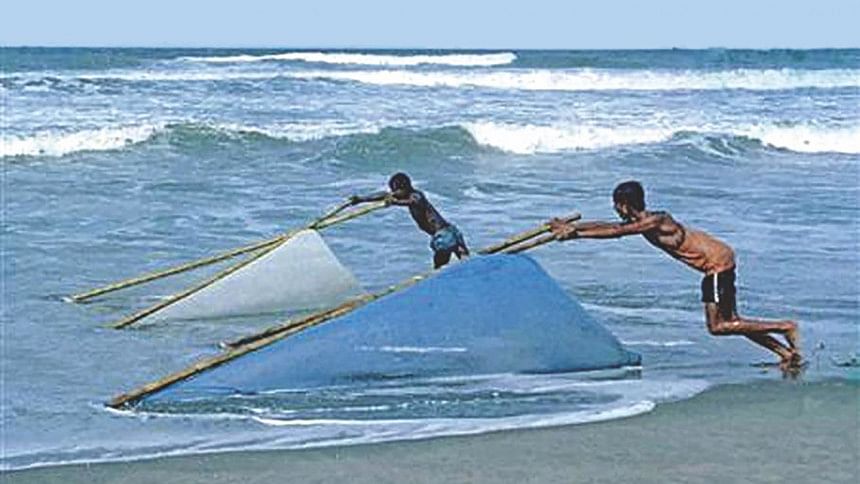
STEPS TAKEN BY BANGLADESH FOR SUSTAINABLE MARITIME DEVELOPMENT
In the past, certain maritime activities were not coordinated and thereby suffered from duplication of efforts, whereas various maritime industries were neither controlled nor their performance supervised. However, under the leadership of Prime Minister Sheikh Hasina, Bangladesh has peacefully resolved the long-standing maritime boundary disputes with its neighbours India and Myanmar, opening a new vista for maritime development in our country. Today we are witnessing an unprecedented wave of economic growth and remarkable development in social and economic indicators with substantial investment in regional connectivity, deep seaports, special economic zones, coastal industries, energy clusters and offshore oil and gas exploration. As a major Blue Economy initiative, Bangladesh Delta Plan 2100 for the next century has been prepared by the government which would focus on sustainable delta management, integrated water resources management and adaptation to climate change. Meanwhile Vision 2041, a long-term perspective plan for a developed Bangladesh, has identified blue economy as one of the essential drivers for development. Moreover, the goals of SDG 2030, especially SDG 14, i.e., Life Below Water, is being implemented with various maritime development agenda in Bangladesh.
An independent Blue Economy Cell has been formed to ensure proper coordination of blue economy activities among all government and private sector maritime stakeholders. Moreover, Bangladesh Ocean Research Institute (BORI) has been established, whereas Bangabandhu Sheikh Mujibur Rahman Maritime University (BSMRMU) was set up in 2013 for maritime higher education and research.
In fact, Bangladesh was one of the first countries in South Asia to focus on the aspects of blue economy leading up to the first international workshop on blue economy in September 2014 in Dhaka. However, the time has come to examine which ministries and organisations are better placed to monitor and coordinate among all private and public maritime stakeholders more efficiently.
There is the need for having a National Ministerial Board for facilitating policy making while an Ocean Advisory Committee comprising maritime experts, scientists, academicians, entrepreneurs and industry leaders should be formed. A Regional Marine Plan Steering Committee with members from the foreign Office and other relevant public and private sector also merits consideration.
MARITIME SAFETY AND SECURITY
We also believe that sustainable blue economy is not possible without ensuring maritime security, preventing piracy, human trafficking, smuggling and all kinds of terrorism in the maritime areas. Given the current global and regional security environment, a comprehensive maritime security structure needs to be formed, recognising the Bay of Bengal as a common security space.
WAY AHEAD
The way ahead for Bangladesh is to develop systems to measure and monitor the performance of the country's ocean economy industries. Maritime capacity building needs to be planned in regard to governance and institutional framework, academic and research institutions, managerial, technical, technological capabilities and qualified skills.
We need to decide which marine sectors to prioritise, based on its domestic needs and demands of global market. We need to examine how Bangladesh should respond to the challenges of MSP and draft an ocean policy vision by charting a course towards a blue horizon in partnership with the regional countries. Bangabandhu gave us the maritime vision and a clear roadmap for excelling in the maritime frontier. It is hsigh time we set our sails and shape course towards a happy, prosperous and developed "Maritime Bangladesh", as envisioned by Prime Minister Sheikh Hasina.
Rear Admiral M Khaled Iqbal, BSP, ndc, psc, is Vice Chancellor, Bangabandhu Sheikh Mujibur Rahman Maritime University.

 For all latest news, follow The Daily Star's Google News channel.
For all latest news, follow The Daily Star's Google News channel. 



Comments